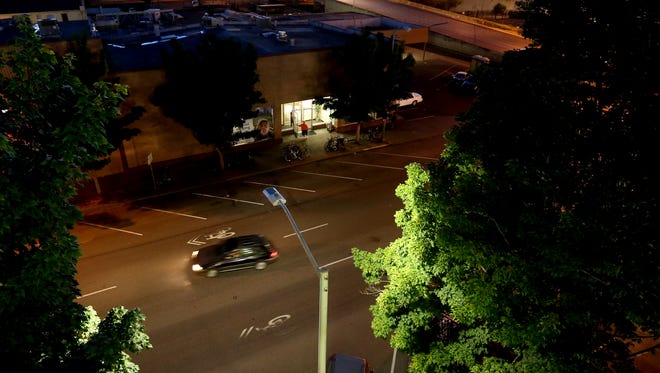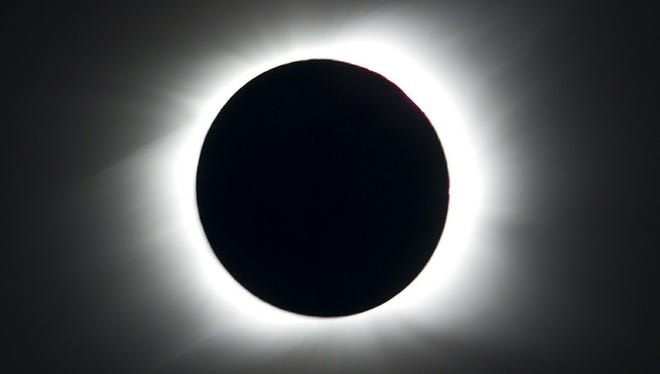Street lights could hinder eclipse for some viewers

SALEM, Ore. — As the moon blots out the sun and skies darken across America on Aug. 21, cities along the path of totality will experience up to 2½ minutes of nighttime darkness in the middle of the day.
But for city dwellers, street lights may be a serious distraction from the rare astronomical event.
During the early stages of eclipse preparation, it became clear to city planners that disabling street lights was infeasible, expensive and unsafe. But allowing them to turn on could wreck the experience for residents at work or home who can't travel to a darker area.
"You definitely don't want to look at the night sky standing next to a street light," said Madhulika Guhathakurta, NASA's lead scientist for the 2017 solar eclipse.
Guhathakurta said any light pollution will affect seeing the corona — which is easily visible during a total solar eclipse — especially for people interested in doing photography or astronomy. For casual viewers, she compared the darkness during a total solar eclipse to a night with full moon. If you want to get a good look at the moon, you wouldn't want to stand near a street light.
Read more:
How fast is the solar eclipse? And 32 other questions, answered
Here's the only way to get an unobstructed view of the eclipse
Richard Watkins, a physics professor at Willamette University, agreed there could be significant impact if someone stands near a street light, but ambient light, if unavoidable, shouldn't lessen the experience too much for the general public. He recommended scouting viewing locations beforehand to check line of sight.
Spokesman for city of Salem public works Mike Gotterba said officials acknowledged that the eclipse would be better without the lights, but other concerns outweighed the probable benefits.
"It's going to be impossible to turn off city of Salem street lights," Gotterba said. "We would be taking away a huge safety and security feature from the city."
Street lights turn on automatically because of an industry standard piece of light-sensitive hardware called a photocell, which allows a circuit to complete after registered light drops beneath a particular threshold. To disable the automatic illumination, you have to remove the photocell, which in turn disables the light entirely.
There is some delay between the triggering of a photocell and the moment a street lights illuminates, so city officials aren't sure at what point during the eclipse lights might switch on. This unknown is compacted by other uncertainties, including how quickly the sky gets dark during an eclipse and how dark an eclipse is at totality.
Most are confident the lights will turn on, but no one can be totally sure.
Technically, the city of Salem could turn off its more than 11,000 street lights, but each light would need to be disabled individually. Also, disabling them in advance of the eclipse would turn them off permanently until crews returned, creating dangerous situations across the city for days.
Officials estimate it takes about 10 minutes to disable a street light, which means it would take one crew nearly 80 days of work — not including time spent driving between sites. The additional costs would be astronomical.
These factors are consistent for cities across the path of totality.

In Columbia, Mo., officials decided in October it didn't make sense to turn off their 10,000 street lights. Ryan Williams, assistant utilities director with the Water and Light Department, said turning all of them off was infeasible, but they decided to deny specific requests, too, since it would be unfair to turn some off and not others.
There are three times as many street lights in Lincoln, Neb., and the same feasibility problems when considering turning the lights off.
"We would have to go street light to street light in order to turn them all off for a short period of time," said Kelley Porter, communications manager with Lincoln Electric System. "That just wouldn't work for us."
One area in Salem that will be darkening its electric glow is Riverfront Park. The lights in the park are on a different circuit, so a worker can turn them off independently, as they do for the Movies in the Park event.
Park supervisor J.D. Clarizio said they don't know how many people will visit the area that morning — considering the expected gridlock and limited parking — but since they have the capability to flip the switch, they will.
"We're trying to enhance the experience and be of service to the city," Clarizio said.
Scientists and city officials recommend onlookers move to an area away from street lights, such as a backyard, or go underneath cover to block out any non-eclipse light. But even if someone in town can't get to an ideal viewing environment, it's still a once-in-a-lifetime event, they said.
"You're still going to watch the moon go in front of the sun," said Kevin Hottmann, city traffic engineer for Salem. "You're still going to see and experience it going dark during the day."

Follow Connor Radnovich on Twitter: @CDRadnovich